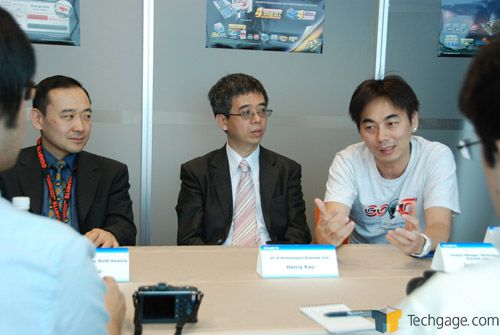- Qualcomm Launches Snapdragon 4 Gen 2 Mobile Platform
- AMD Launches Ryzen PRO 7000 Series Mobile & Desktop Platform
- Intel Launches Sleek Single-Slot Arc Pro A60 Workstation Graphics Card
- NVIDIA Announces Latest Ada Lovelace Additions: GeForce RTX 4060 Ti & RTX 4060
- Maxon Redshift With AMD Radeon GPU Rendering Support Now Available
Gigabyte Discusses Market Position, Goals and the Future
During a meeting with some of Gigabyte’s VPs, we learned about the company’s strategies and also delved into its outlook into the future of computing as it sees it. As far as the company is concerned, there’s little reason to believe that the desktop market is dying. In fact, it believes that in the near-future, it will begin to grow, interestingly enough.
The VP of Motherboard Business Unit at Gigabyte’s Taiwan HQ, Henry Kao, stated that he sees the insurgence of things like smartphones and other mobile devices, like the iPad, to begin to hurt notebook sales, rather than desktop sales. The reason? Mobile devices are important, and useful, but Henry believes that the majority of people would still prefer the performance and ability to store all of their data on a desktop PC. I tend to agree, but this market is volatile and can change fast, as we’ve seen.
Gigabyte’s confidence in mobile devices is rather interesting also, but Henry made it clear that the company isn’t yet interested in delving into the market in the obvious way. It’s easy to understand why, as competitor ASUS has had a truly difficult time with market success with its mobile line-up. Rather, Gigabyte is interested in the time-being to support mobile devices in other ways. One example is with its motherboards that support iPad charging.
At the beginning of the meeting, Henry Kao mentioned that Gigabyte recently surpassed its leading competitor as the motherboard “market leader”. While ASUS seems to be better known in the US, the same seems to be different for Gigabyte on a worldwide scale. Personally, it’s difficult for us to even guess, as there seems to be an even spread of both ASUS and Gigabyte. Henry also stressed that Gigabyte is also #1 in innovation, quality and support. For most, this will boil down to opinion.
Tony Liao, VP of Sales & Marketing for North America, stated that the company has entered its 24th year and has reason to celebrate. Moving from 2009 – 2010, the company experienced a 20% growth in North America. The company gives many reasons for this, most of which has to do with both quality and service.
One other interesting tidbit that Henry mentioned was that in the grand scheme of things, Gigabyte doesn’t consider ASUS to be its main competitor, but rather Intel. To date, Gigabyte has had a difficult time penetrating the OEM market, where Intel has excelled. In recent years, the company has consciously avoided competition with Intel due to the sheer difficulty of it all. Things are changing, though, and Tony Liao expects that Gigabyte will surpass either ASUS and Intel in terms of sales within the next two years.
Before the conclusion of the meeting, Tony mentioned that Gigabyte has thoroughly enjoyed focusing its products for overclocking use, and also sponsoring overclocking competitions. So, it looks as though overclockers will still be taken good care of well into the future, and in a big way.





